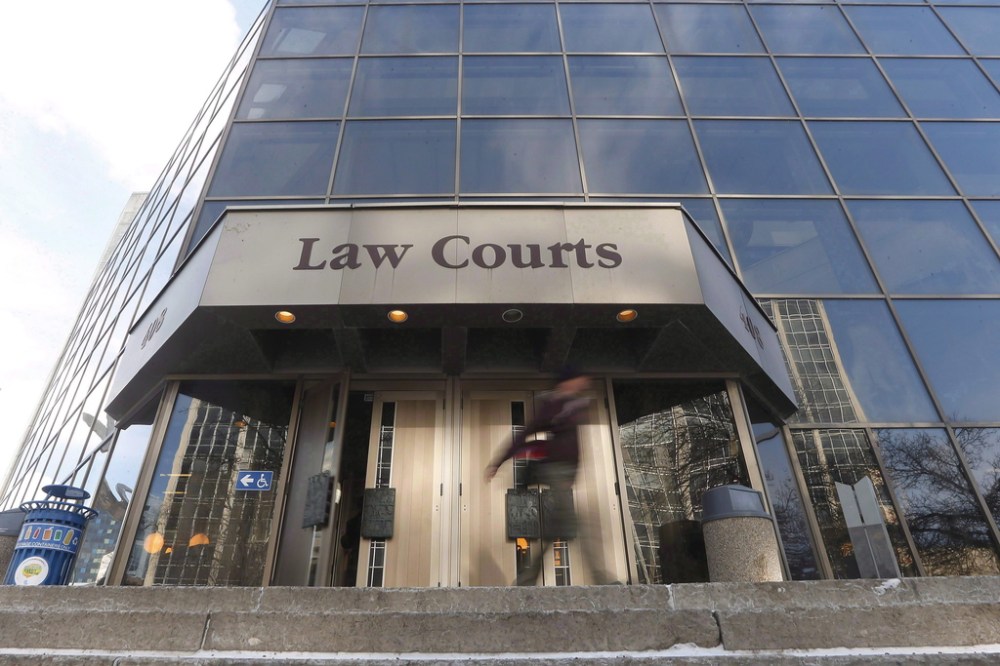Courts add gender to introductions
Manitoba's judicial system sends message of acceptance, respect with change
Advertisement
Read this article for free:
or
Already have an account? Log in here »
To continue reading, please subscribe:
Monthly Digital Subscription
$19 $0 for the first 4 weeks*
- Enjoy unlimited reading on winnipegfreepress.com
- Read the E-Edition, our digital replica newspaper
- Access News Break, our award-winning app
- Play interactive puzzles
*No charge for 4 weeks then billed as $19 every four weeks (new subscribers and qualified returning subscribers only). Cancel anytime.
Read unlimited articles for free today:
or
Already have an account? Log in here »
Hey there, time traveller!
This article was published 18/06/2021 (1036 days ago), so information in it may no longer be current.
Manitoba’s three courts will soon ask lawyers to state their gender, as well as that of their clients and witnesses, as part of a shift advocated by trans, two-spirit and non-binary people.
“We live in a democracy, in a pluralistic society, and I think reasonable people understand that institutions have to be increasingly reflective of that plurality,” Court of Queen’s Bench Chief Justice Glenn Joyal told the Free Press.
It’s part of a societal shift towards people introducing themselves by indicating gender, to normalize people don’t always identify as male or female, or might not be the gender a stranger automatically assumes.

In both trial courts, lawyers will be expected to introduce themselves as well as their clients or witnesses using a title, like Mr., Ms., Counsel or Mx. (pronounced “mix”), with the latter referring to people who don’t fit the gender binary.
If lawyers don’t indicate these titles, court clerks will ask them to — but Joyal said it’s still optional to do so.
“If the person doesn’t say anything, we’re not going to be outing anybody,” he said.
Joyal said he’d never witnessed someone in court say they were misgendered in his 23 years on the bench, but said this might have happened without him even knowing.
“We all have friends who felt the hurt or the burden of not being recognized, or not being treated properly for whatever reason.”
All three Manitoba courts have issued such directives in the past month. Both trial courts set to implement the policy Sept. 13, as they have few hearings in the summer.
The appeal court — which primarily hears from lawyers — implemented its own policy May 27, and asks lawyers to provide these titles in writing.
“It sends a message to everyone about acceptance and respect,” said Karen Busby, a University of Manitoba law professor, who has a handful of trans and non-binary students each year.
“It’s important to them that the court is recognizing that they exist, and they will be respected in the courtroom.”
Busby added Manitoba courts have tried to be progressive, for example, with the 2015 appointment of the first trans person to the bench, Provincial Court Judge Kael McKenzie.
Joyal and Busby noted lawyers had advocated for such changes through a Canadian Bar Association committee, and both believe Manitoba is the second province with courts making such a change.
Last fall, British Columbia’s three courts started asking lawyers to indicate whether their pronouns are he, she or they, when introducing themselves.
Those changes garnered some pushback, from lawyers arguing the policy effectively pushes them to endorse a view on gender.
Joyal said he and the heads of Manitoba’s provincial and appeals courts only expect some opposition.
“We’re hoping that it’s going to be received well by the bar and the general population,” he said, arguing the best way to avoid controversy is to just make it a habit.
“We do want to normalize this; we want this in a sense to become routine. We don’t want this to become an exhibition.”
dylan.robertson@freepress.mb.ca


